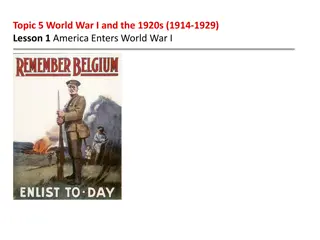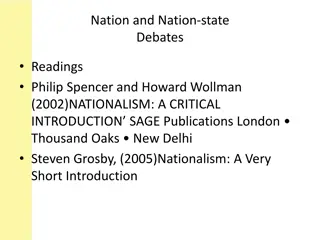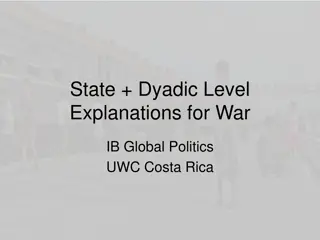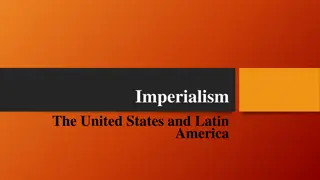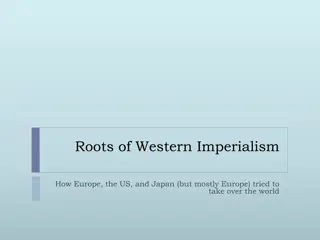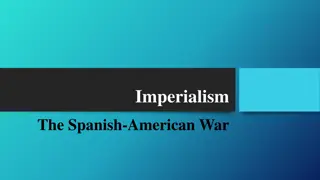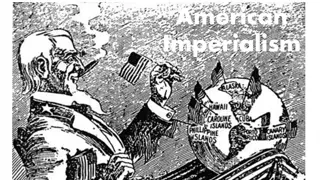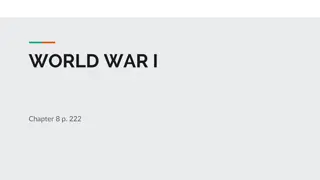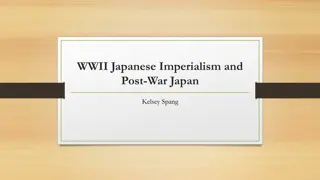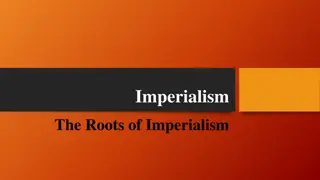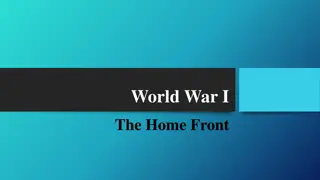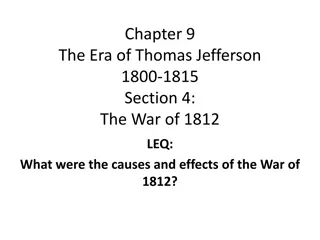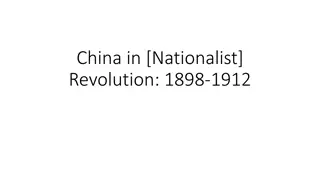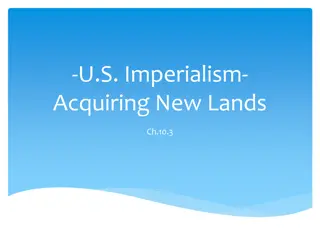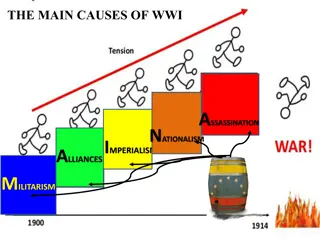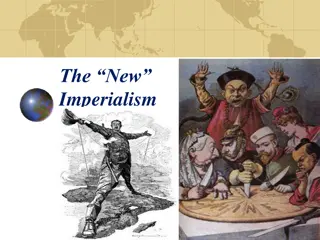Nation, Imperialism, War.
Examining the concepts of nation, imperialism, and war, John Milios offers a critical analysis of prevailing theories of imperialism. This insightful work challenges traditional perspectives and delves into the complexities of imperial practices throughout history.
Download Presentation

Please find below an Image/Link to download the presentation.
The content on the website is provided AS IS for your information and personal use only. It may not be sold, licensed, or shared on other websites without obtaining consent from the author.If you encounter any issues during the download, it is possible that the publisher has removed the file from their server.
You are allowed to download the files provided on this website for personal or commercial use, subject to the condition that they are used lawfully. All files are the property of their respective owners.
The content on the website is provided AS IS for your information and personal use only. It may not be sold, licensed, or shared on other websites without obtaining consent from the author.
E N D
Presentation Transcript
Nation, Imperialism, War. A critique of mainstream theories of imperialism John Milios
I. Non-correspondence between state and capital vs. aggregate-social-capital 2 Mainstream theories of imperialism argue that individual capitals from the imperialist countries develop on a geographical terrain that greatly transcends the borders of the state of origin: Variant 1: capital does not cease to be the possessor of its original state-related identity. Variant 2: global economic-political structures are created that subordinate states thereto. Both variants fail to perceive the state as the ideal collective capitalist who solidifies the class interest of all individual capitals within a capitalist social formation. The modern state, no matter what its form, is essentially a capitalist machine, the state of the capitalists, the ideal aggregate-social capitalist (Fr. Engels, Anti- D hring, Part III, Ch. II).
Capital as a social relationship 3 Capital is a social relationship that is reproduced in a complex way in the framework of a specific social formation. Individual capitals within a social formation, are transformed through competition into elements of aggregate-social-capital (Gesamtkapital). Production founded on capital for the first time posits itself in the forms adequate to it only in so far as and to the extent that free competition develops [ ] Free competition is the real development of capital. Byits means, what corresponds to the nature of capital is posited as external necessity for the individual capital (Marx, Crundrisse: 650-1).
Aggregate-social-capital and social formation 4 It is in no way possible for individual capitals to break away from the aggregate-social-capital of a given social formation, to form a transnational capitalist class or transnational historic bloc or even to be metamorphosed into entities non-correspondent with some specific collective capitalist. The legal property forms of the means of production do not necessarily correspond to the real property relations of the means of production. Capital exports function as part of the aggregate-social-capital in its host country, because it functions there as productive capital exploiting domestic workforce.
Legal vs. real-economic property 5 But the circumstance that some means of labour are fixed in location, with the roots in the soil, gives this part of the fixed capital a particular role in a nation s economy. They cannot be sent abroad or circulate as commodities in the world market. It is quite possible for the property titles to this fixed capital to change; they can be bought and sold, and in this respect circulate ideally. These property titles can even circulate on foreign markets, in the form of shares, for example. But a change of the persons who are the owners of this kind of fixed capital does not change the relationship between the static and materially fixed part of the wealth of a country and the movable part of it (Capital, Vol 2: 242).
II. Global capitalism vs. the imperialist chain 6 The idea that imperialist capitalism becomes a global system predominated the revolutionary wing of the Social Democracy during World War I and led to political positions that disputed the right of nations to self-determination. Lenin came out against this strategy, which led him finally to a break with the theory of global capitalism. He formulated the concept of the imperialist chain as an international economic and political space linking together the different aggregate-social- capitals and capitalist social formations. A particular social formation depends on the way in which the external situation (the international interconectedness of the different capitalist social formations) over-determines but also constrains the evolution of the internal class correlations.
Imperialism and class struggle 7 The international conjuncture is incorporated in a complex way as a secondary contradiction within a social formation, in the sense that it does not have priority over class struggle. The West-European bourgeoisie had always been opposed to revolution. [...]. But things turned out differently. The imperialist war split the European bourgeoisie, and this created a situation where the Anglo-French capitalists, for imperialist reasons, became supporters of a Russian revolution. [...] The revolution has thus gained an unexpected ally. As a result, the revolution has turned out to be different from what anyone expected (Lenin, April 1917, CW, vol. 24).
8 Imperialism and the capitalist mode of production Imperialism as the expansionist tendencies and practices of each and every capitalist social formation (link of the imperialist chain), emerges out of the structures of the capitalist mode of production. The historical form that these tendencies will acquire for a particular social formation depends on the way in which the external situation (i.e., the international correlation of forces) is incorporated in the internal class correlations. Imperialist strategies will never radically draw into question the global flows of commodities and capital, i.e., the capitalist nature of the international economic sphere. The unequal links in the imperialist chain have in common a certain shared strategic interest: reproduction of the capitalist system of domination. However great the sharpening of the geopolitical or economic conflicts (e.g. war), they will never on their own go so far as to reverse this constant.
III. Nationalism as a new era within capitalist social formations A turning point in the history of capitalist social formations was the emergence of nationalism as the national politicisation of the masses,since the first half of the nineteenth century, in the wake of the American and French Revolutions. 9 Nationalism creates the nation and profoundly rearranges the way populations (social classes) are subjected to capitalist power relations. The emergence of modern nations is thus affiliated with unprecedented institutional and state-related changes: institutions of representation and novel ways of integrating populations into the state, political parties, constitutional order (or the prospect thereof), irredentism and national cleansing , etc.
Nationalism and imperialism 10 The nation is the people of a state , i.e., is related to the interior of a state territory, as demand for political rights, and yet for national clarity and purity as well, and to its exterior, as demand for the expansion of state ( national ) influence and often for a correction of its borders. The nation is the people of a state , i.e., related to the interior of a state territory, as demand for political rights, and yet for national clarity and purity as well, and to its As a nation state exists in order to express the will of the nation , class differences are obscured. The demand for national unification and integration is often the motive force for annexation of territories where a minority of fellow-nationals of the country carrying out the annexation exists, or predominates economically, or else where the national culture is supposed to have been present in the historical past.
Nationalism and war 11 The nation (nationalism) has not only changed the capitalist state and the framework in which the inherent in capitalism imperialist tendencies develop. It has also changed changed warfare, as it enabled the formation on the one hand of enormous national armies and on the other of soldiers ready to sacrifice their lives just for the sake of the fatherland . The modern warfare is the necessary product of the French Revolution. Its precondition is the social and political emancipation of the bourgeoisie and small peasants. The bourgeoisie provides the money, the small peasants supply the soldiers. [...] [T]he degree of wealth and education connected with this stage of social development is equally required in order to provide the material, [...] and to give the soldier himself the required degree of intelligence (Engels, 1851, in MECW, Vol. 10: 550).
Nationalism, imperialism and the imperialist chain Capitalism is not simply capital accumulation ; it is a system of economic, political and ideological domination of the ruling class over the working class and social majority. What theories of imperialism often fail to recognise, is the role of the nationalism of the masses in supporting the imperialism of capitalist states. Historical development cannot be adequately explained on the basis of the interests of great powers . 12 Despite the fact that the links of the imperialist chain are of unequal strength, meaning that the superpowers can claim the lion s share in the quest for international influence, they are also subject to the relationship of class forces (internal and international) that is formed in each specific historical conjuncture.
IV. Concluding remarks 13 A theory of imperialism, if based on Marx s theory of capitalism, must refer to the expansionist tendencies (economic, political and ideological) inherent in every system of capitalist power (in every capitalist social formation), giving special interest to the question of nationalism and national conflict. In this way, we may interpret a whole series of developments that obviously involve actors other than the great powers : the Iran- Iraq war, 1980-88, the wars in the former Soviet Union and Yugoslavia and the creation of new nation-states, the Syrian military presence in Lebanon from May 2000 to April 2005, the Vietnamese military presence in Cambodia from 1978 to 1989, the India-Pakistan conflict, the Cyprus problem, the rise and fall of the Islamic State etc.
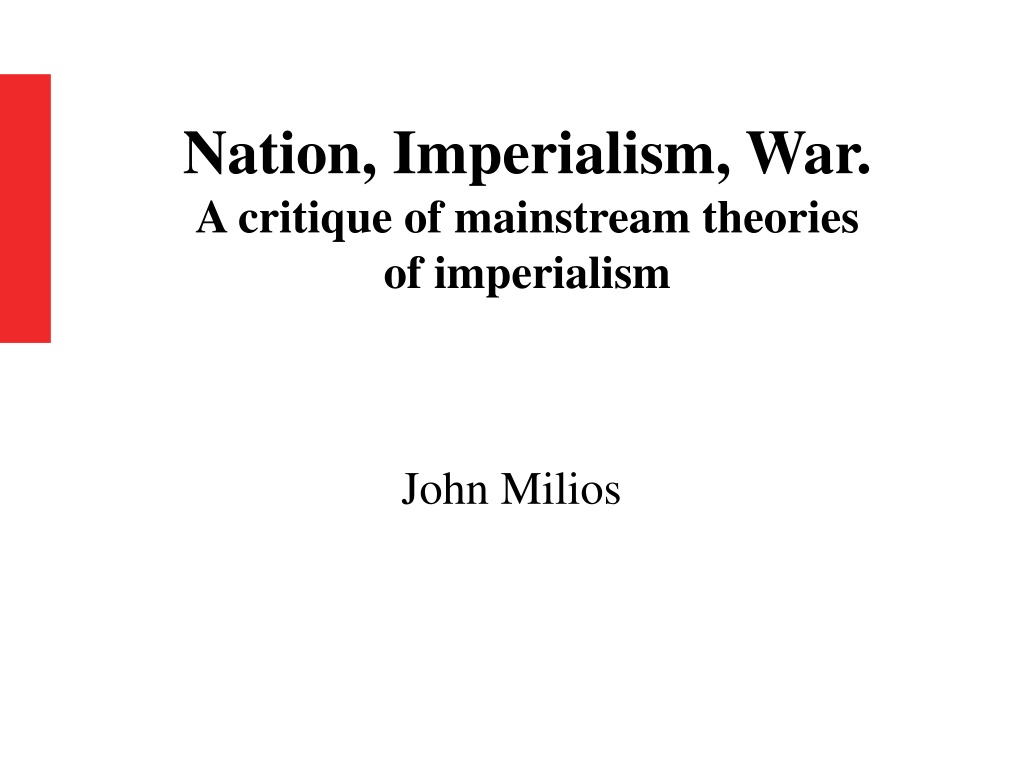





![❤[PDF]⚡ Civil War Talks: Further Reminiscences of George S. Bernard and His Fel](/thumb/20551/pdf-civil-war-talks-further-reminiscences-of-george-s-bernard-and-his-fel.jpg)
